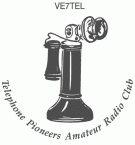 |
| About TPARC |
| Network Map |
| Services |
| Network How-to |
| Node Hardware |
| Membership |
| News |
Some documents linked from this page may require Adobe Acrobat PDF reader.
Last Updated August 2, 2021
Telephone Pioneers Amateur Radio Club
TPARC Services
ROSE Packet
The present TPARC network uses the ROSE switch software from the Radio Amateur Telecommunications Society (RATS). This software is a shareware product. TPARC has contributed a shareware registration fee to RATS.
The ROSE X.25 Packet Switch supports the global addressing plan adopted by CCITT and ISO. This plan includes a country code and a national network number. The ROSE Switch follows the numbering plan in use in the national X.25 packet switching network. Most packet networks follow the telephone numbering plan used in that country. North America used the telephone Area Code and Exchange.
This system allows a user to request a connection with another station without any concern given to the exact path the data will follow. This is in sharp contrast to the explicitly specified approach used by digipeaters. The user only has to specify the call sign of their entrance switch into the network and the exit address to reach the desired station.
The ROSE Switch may be configured with several paths (routes) to remote Area Codes or countries. Each of the specified links will be tried in the order they were specified to find an operational route. This is an improvement on several existing amateur systems which can only provide implicit destination routing to switches known by the source switch.
The telephone exchanges are allocated based on the population density of each area. A single ROSE X.25 Switch can provide RF coverage of many different exchanges. A full list of exchanges that the switch should handle as its own is specified.
The addressing also needs to support routing to different countries. The X.121 standard handles this with a prefix country code. In data networks the country code is called the Data Network Identification Code (DNIC). The ROSE Switch supports up to 8 different DNICs, and will be expanded as the network grows.
Future Network
TPARC is presently developing a migration and overhaul plan for the core network. This network ovehaul will focus on the following points:
- increase backbone trunk speed
- provide seamless integration with TCP/IP
- allow multiple services to be operated over the network simultaneously
- provide reduntant/ring connections for failover protection
- provide internet tunnel support to remote networks
Concepts are presently being tested in a lab environment and then will be implemented and tested in on the real network.
Once proven solutions are ready for deployment, they will be integrated into the network on a site by site basis.